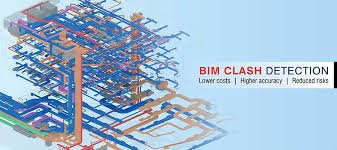In an era defined by rapid technological advancements and evolving industry standards, the construction sector is undergoing a profound transformation. At the forefront of this revolution are Building Information Modeling (BIM) advisory services, which play a pivotal role in future-proofing construction projects. In this blog, we explore the latest innovations in BIM advisory services and their impact on the construction industry’s trajectory towards a more efficient, sustainable, and collaborative future.
The Evolution of BIM Advisory Services
BIM advisory services have evolved from traditional consultancy to strategic partners driving innovation and efficiency in construction projects. By providing expert guidance on BIM implementation, process optimization, and technology integration, BIM advisors help clients navigate complex challenges and capitalize on emerging opportunities in the digital era.
Digital Twin Technology Enhancing Project Visualization and Simulation
One of the most significant innovations in BIM advisory services is the adoption of digital twin technology. By creating virtual replicas of physical assets, digital twins enable stakeholders to visualize and simulate construction projects in unprecedented detail. BIM advisors leverage digital twins to optimize design decisions, predict performance outcomes, and streamline project delivery, ultimately enhancing efficiency and reducing risks.
AI and Machine Learning
AI and machine learning algorithms are revolutionizing BIM advisory services by augmenting decision-making capabilities and predictive analytics. By analyzing vast amounts of data, AI-powered tools can identify patterns, detect anomalies, and optimize construction processes in real-time. BIM advisors leverage AI to improve project planning, resource allocation, and risk management, driving greater efficiency and cost-effectiveness.
Cloud-Based Collaboration Platforms
Cloud-based collaboration platforms have become indispensable tools for BIM advisory services, enabling seamless communication and coordination among geographically dispersed teams. By centralizing project data and fostering real-time collaboration, cloud platforms enhance efficiency, transparency, and accountability throughout the construction lifecycle. BIM advisors leverage cloud technology to facilitate remote work, streamline document management, and foster collaboration among project stakeholders.
Block chain Technology Enhancing Data Security and Transparency:
Blockchain technology is transforming BIM advisory services by enhancing data security, integrity, and transparency. By creating tamper-proof digital ledgers, blockchain ensures the immutability and traceability of project data, reducing the risk of fraud, errors, and disputes. BIM advisors leverage blockchain to securely manage project information, streamline transactions, and build trust among project stakeholders, ultimately enhancing project outcomes and stakeholder confidence.
Parametric Design and Generative Algorithms
Parametric design and generative algorithms are reshaping the design process in construction projects, enabling BIM advisors to explore and optimize design alternatives rapidly. By defining relationships and constraints within a digital model, parametric design tools generate iterative design solutions that meet project objectives and performance criteria. BIM advisors leverage parametric design to drive design innovation, optimize resource utilization, and achieve sustainable outcomes in construction projects.
Augmented Reality (AR) and Virtual Reality (VR) Technologies
AR and VR technologies are revolutionizing BIM advisory services by enhancing project visualization and stakeholder engagement. By immersing stakeholders in virtual environments, AR and VR enable them to experience construction projects in 3D, visualize design concepts, and provide feedback in real-time. BIM advisors leverage AR and VR to enhance client presentations, facilitate design reviews, and improve communication among project stakeholders, ultimately fostering greater collaboration and understanding.
Predictive Analytics and Performance Monitoring
Predictive analytics and performance monitoring tools enable BIM advisors to optimize operational efficiency and lifecycle management in construction projects. By analyzing historical data and real-time performance metrics, predictive analytics algorithms forecast project outcomes, identify potential risks, and recommend proactive interventions. BIM advisors leverage predictive analytics to optimize asset performance, minimize downtime, and enhance sustainability throughout the project lifecycle.
Integrated Project Delivery (IPD) and Lean Construction Principles
Integrated Project Delivery (IPD) and Lean Construction principles are foundational concepts cutting-edge BIM advisory services, promoting collaboration, efficiency, and value creation in construction projects. By fostering early stakeholder engagement, shared risk, and collaborative decision-making, IPD and Lean Construction principles enable BIM advisors to optimize project delivery processes, minimize waste, and maximize project value for clients.
Regenerative Design and Circular Economy Practices Driving Sustainable Innovation:
Regenerative design and circular economy practices are driving sustainable innovation in BIM advisory services, promoting resource efficiency, waste reduction, and environmental stewardship in construction projects. By embracing principles of regenerative design and circular economy, BIM advisors prioritize the use of renewable materials, minimize energy consumption, and design for disassembly and reuse, ultimately creating buildings and infrastructure that contribute positively to the environment and society.
Conclusion
Innovations in BIM advisory services are reshaping the future of construction, driving efficiency, sustainability, and collaboration across the industry. ENGISOFT ENGINEERING – BIM Staffing & BIM Services by leveraging digital twin technology, AI, cloud-based collaboration platforms, blockchain, parametric design, AR/VR, predictive analytics, IPD, and regenerative design principles, BIM advisors are at the forefront of transforming construction practices and delivering value to clients and communities.









